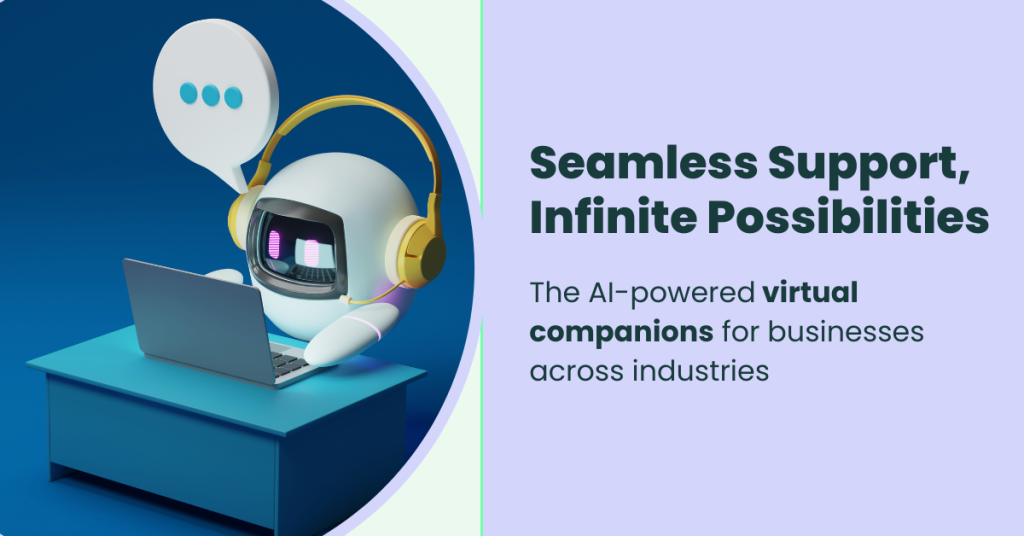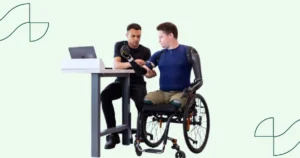A complete guide on AI-powered personal assistants with examples

We’re increasingly relying on Artificial Intelligence (AI)-powered personal assistants, including AI executive assistants, more and more, not just in the workplace but within our personal lives for health, well-being, and entertainment. For example, our virtual companions from our phones can tell us if we need an umbrella for the day ahead, what the traffic is going to be like on the usual route home, and even provide company to those who feel lonely. In this article, we’ll break down the rise of personal assistant AI and how it’s going to be transformative for our society, serving a greater purpose across all industries.
What are AI personal assistants?
AI-powered personal assistants, a form of personal artificial intelligence, are virtual software agents designed to assist users with various tasks and provide information using artificial intelligence technologies. These assistants leverage natural language processing (NLP), machine learning, and other AI techniques to understand and respond to user inputs in a human-like manner to complete tasks with automation and ease.
The key features of generative AI personal assistants
Virtual companions often leverage advanced techniques such as natural language generation (NLG) and deep learning, which come with several key features:
- Natural Language Understanding (NLU) – The ability to comprehend and interpret user queries and commands in natural language, facilitating more intuitive interactions.
- Generative capabilities – Dynamic generation of human-like responses, allowing the assistant to provide contextually relevant and personalised information.
- Context awareness – Maintenance of context over multiple interactions, enabling more coherent and relevant responses based on ongoing conversations.
- Learning and adaptation – Continuous learning from user interactions to improve performance, understand preferences, and adapt to evolving user needs.
- Task automation – Performance of a variety of tasks based on user requests, from simple commands to more complex and context-specific actions.
- Conversational flow – Enhancement of conversation flow by understanding context, maintaining coherence, and avoiding repetitive or disjointed responses, contributing to a more natural interaction experience.
Understanding the rise and need for personal AI assistants
Emerging in the last decade, these intelligent assistants, such as AI executive assistants, gained prominence as technology giants such as Apple, Google, Amazon, and Microsoft invested heavily in developing sophisticated conversational AI. So many companies have undergone digital transformations in the last 10 years, and this has built an inquisitive culture. With technological solutions at our fingertips, we analyse and review the ways our industries work, questioning whether we can use data to create greater efficiency and results. The convergence of powerful algorithms, vast datasets, and improved hardware-enabled personal assistant AI solutions understand and respond to user queries in a more nuanced and context-aware manner. This is revolutionising the way individuals interact with technology and seamlessly integrating these assistants into various aspects of daily life.
Bill Gates has commented that soon, everyone will have their very own personal assistant through Artificial Intelligence(AI). He believes that as Information Technology develops and improves, we’ll move away from having separate apps for specific functions, and we’ll be able to vocalise to our devices what to do. Whether that’s to find a venue for your child’s birthday party that’s within your budget, provide some innovative solutions to a work problem (replicating a brainstorming session between colleagues), or tell you what workout to complete to meet targets without harming a current injury you have. Our devices will get to know us, just like a human personal assistant would, to make intelligent recommendations based on our personalities and needs.
Best 5 leading AI-powered personal assistants
- Apple Siri: Integrated into Apple devices, Siri provides voice-activated assistance to iOS and macOS users, making it one of the prominent AI assistant devices.
- Google Assistant: Available on Android devices and other platforms, Google Assistant helps users perform tasks, answer questions, and control smart devices.
- Amazon Alexa: Found on Amazon Echo and other Alexa-enabled devices, Alexa is known for its smart home integration and wide range of skills.
- Microsoft Cortana: Originally integrated into Windows devices, Cortana provided voice-activated assistance and productivity features.
- Samsung Bixby: Featured on Samsung smartphones and other devices, Bixby offers voice commands and personalised recommendations.
These assistants aim to enhance user convenience and productivity by streamlining various aspects of daily life through natural and intuitive interactions.
Use cases of AI personal assistants in different industries
The capabilities of AI-powered personal assistants are endless both in the business world and at home. Here are a few examples that highlight the broad spectrum of use cases:
Healthcare
We’re seeing generative AI personal assistants assist medical assistants by generating detailed patient summaries based on electronic health records, facilitating more efficient and accurate decision-making. Patients can be provided with personalised health recommendations and reminders of their medication schedules.
Manufacturing
In the manufacturing industry, generative AI personal assistants can optimise production processes by generating predictive maintenance schedules for machinery, reducing downtime and enhancing operational efficiency. They can also assist engineers in designing and refining product prototypes by providing real-time simulations and data-driven insights.
Human resources
Recruitment processes can be streamlined by automatically screening resumes, scheduling interviews, and even conducting initial candidate assessments. These assistants can also assist employees with HR-related queries, providing information on company policies & benefits and facilitating smoother onboarding experiences.
Retail
Generative AI personal assistants in the retail sector can enhance the customer shopping experience by providing personalised product recommendations based on individual preferences and purchase history. They can let customers know what aisle they’ll find their desired product on. These assistants can also assist store employees by generating real-time inventory reports, optimising restocking procedures, and offering insights into customer trends to refine marketing strategies.
Education
Within the education sector, generative AI personal assistants can serve as virtual tutors, generating interactive and personalised learning materials tailored to individual student needs. These assistants can also aid educators by automating administrative tasks, such as grading assignments and managing schedules, allowing teachers to focus more on direct student engagement and instructional strategies.
Customer Assistance
In customer service, generative AI personal assistants can handle a wide range of inquiries, providing instant and accurate responses to frequently asked questions. These assistants can escalate complex issues to human agents while ensuring a seamless transition of information, improving overall customer satisfaction and freeing up human agents to address more nuanced customer needs.
Finance
Within the finance industry, generative AI personal assistants can assist financial advisors by generating detailed investment analyses and providing real-time market insights. They can also support customers by offering personalised budgeting advice based on the user’s historic spending habits, helping them make informed financial decisions and manage their portfolios more effectively.
The benefits of AI in personal assistants
AI-powered personal assistants, as a form of personal artificial intelligence, provide many benefits from both a business and personal perspective.
They help those affected by the loneliness epidemic
Loneliness has a huge impact on our health, with doctors telling us it’s just as bad as smoking. While we’re the most connected at this point thanks to social media, loneliness is a huge issue in our society. And not just with our elderly population; it has been reported that those aged between 16-29 are over two times as likely to report feeling lonely often or always than those over 70.
AI personal assistants hold immense promise in addressing the pressing issue of epidemic loneliness in health and social care. As a companion and support system, these assistants can provide continuous engagement and emotional support to individuals. Through natural language processing and empathetic responses, these assistants can engage in meaningful conversations, share stories, and even provide reminders for medication or daily activities. Additionally, they can connect users with relevant community resources, fostering a sense of belonging and reducing feelings of loneliness.
Increased everyday productivity
AI personal assistants automate routine tasks, enabling employees to focus on more strategic and complex aspects of their work, including setting and achieving smart goals for administrative assistants. This efficiency boost leads to improved productivity and streamlined business processes. The mistakes that naturally occur with human intervention are prevented.
Enhanced customer service
AI personal assistants in customer-facing roles can provide instant and accurate responses, improving overall customer satisfaction. Businesses can provide 24/7 customer service for their clients and customers, boosting their reputation. This leads to increased customer loyalty and positive brand perception, crucial for long-term business success.
Time and money-saving
Time costs money which is why automation is vital for a growing business. AI personal assistants can transform what a business achieves day to day and can create savings by reducing reliance on manual labour. They can instantly analyse vast datasets quickly, providing valuable insights that support data-driven decision-making. This speeds up the time it takes to complete market analysis, trend identification, and strategic planning. For individual users, AI personal assistants help by automating various tasks, such as setting reminders, sending messages, and scheduling appointments, and help in budgeting, expense tracking, and finding cost-effective solutions.
Enhanced Security
For instance, smart home environments can be programmed to monitor and alert users about potential safety hazards, such as leaks, fires, or unauthorised access. In industrial settings, AI assistants can assist with predictive maintenance, identifying potential equipment failures before they pose safety risks, thereby enhancing overall workplace safety and preventing accidents.
Health and well-being
Personal AI assistants can boost health and well-being by providing personalised health reminders, tracking fitness goals, and offering nutritional advice, fostering a proactive approach to overall wellness. Additionally, through empathetic interactions and mental health support, these assistants can contribute to stress reduction and emotional well-being, promoting a holistic and supportive approach to personal health.
Upcoming trends for AI personal assistants
As technology evolves, through R&D activities, we’ll see advancements in the capabilities of AI personal assistants. Here are our predictions for upcoming trends we’ll see:
Transparent data handling policies
As concerns about data privacy grow, AI personal assistant developers may adopt clearer and more understandable data handling policies. This could involve providing users with detailed insights into how their data is used, shared, and stored, fostering trust and informed decision-making.
Enhanced emotional intelligence
Future AI personal assistants may incorporate more advanced emotional intelligence features, allowing them to better understand and respond to users’ emotions. This could involve improved sentiment analysis, natural language processing, and empathetic communication, making interactions more human-like and supportive.
Continued integration with smart devices
AI personal assistants will likely continue to integrate with an expanding array of smart devices, offering users a centralised and cohesive control hub for their connected environments. This integration may extend to more IoT (Internet of Things) devices, smart homes, and wearable technologies, creating a more interconnected and intelligent ecosystem.
Concluding thoughts
To conclude, the acceleration of AI personal assistants, including AI assistant devices, is reshaping our professional and personal lives, offering transformative benefits. From optimising business efficiency to tackling societal issues like loneliness, these assistants have become integral. With promises of heightened productivity, superior customer service, cost and time savings, enhanced safety, and improved well-being, they represent a pivotal evolution in human-machine interaction. As we navigate this trajectory, the ongoing innovation in these AI companions holds the potential to redefine our daily lives, especially by setting smart goals for administrative assistants.
Did you develop an AI Personal assistant?
There are limitations of chatbots and virtual companions with lots of room for improvements. This is what the R&D incentive is all about; making a technical or scientific advancement past an existing uncertainty that poses an industry challenge. This could be improving a process or making something entirely new. If you have spent any money working with AI technology for personal assistants then you could receive some money back for your efforts from HMRC. Through our team’s robust compliance processes, the R&D claims we have completed on behalf of our clients have secured over £83 million. This money makes a huge difference to the growth of your business and helps you to take your innovation much further. Contact us and we can determine your eligibility with no upfront costs!







